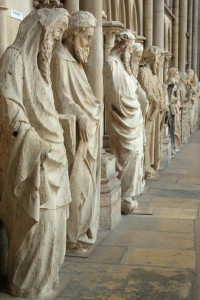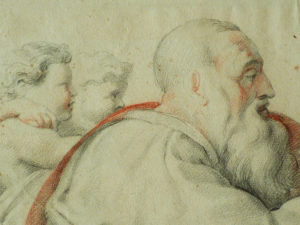Posted by Roberta Grimes • January 19, 2019 • 18 Comments
Jesus, The Teachings of Jesus, Understanding Reality
 I had mostly drafted my promised ideas about the dawning of the kingdom of God on earth when I realized that before I posted them I ought to share with you one more thing that Jesus came to do for all of humankind. He came to abolish the concept of sin and transform our notion of right and wrong! I blush to admit that this added mission has only lately occurred to me, when clearly it was not an afterthought. In fact, I am beginning to see that killing the whole fear-based notion of sin is the core of what Jesus came to do. It really changes everything!
I had mostly drafted my promised ideas about the dawning of the kingdom of God on earth when I realized that before I posted them I ought to share with you one more thing that Jesus came to do for all of humankind. He came to abolish the concept of sin and transform our notion of right and wrong! I blush to admit that this added mission has only lately occurred to me, when clearly it was not an afterthought. In fact, I am beginning to see that killing the whole fear-based notion of sin is the core of what Jesus came to do. It really changes everything!
Jesus talks about sin throughout the Gospels, which is probably why I missed what He was saying. He cleverly misled the Temple guards, and He just as cleverly misled me! For Jesus to speak against the prevailing religion would have been a capital crime, so He could not flat-out tell the world that He had come to abolish all religions, toss out the entire Old Testament, and end the very notion of sin. All of this was His earthly mission, but He couldn’t say that plainly! We have been talking of late about how He was able to get most of His message through by using some devices that we must keep in mind if we hope to understand His message. By accepting those tricks and digging deeper, we have learned from the Gospels that Jesus came to help us relate to God on our own so we can better raise our spiritual vibrations away from fear and toward more perfect love, and thereby bring the kingdom of God on earth.
 He accomplished much of this with a single stroke! When He was asked what was the greatest commandment, He didn’t name any of the Ten Commandments. Instead He said,“‘You shall love the Lord your God with all your heart, and with all your soul, and with all your mind.’ This is the great and foremost commandment. The second is like it, ‘You shall love your neighbor as yourself.’ On these two commandments depend the whole Law and the Prophets” (MT 22:37-40). The Law and the Prophets was of course what the Jews of His day called our Old Testament. And He confirmed that His abandonment of religious laws was consistent with the divine plan when He said, “Do not think that I came to abolish the Law or the Prophets; I did not come to abolish but to fulfill” (MT 5:17).
He accomplished much of this with a single stroke! When He was asked what was the greatest commandment, He didn’t name any of the Ten Commandments. Instead He said,“‘You shall love the Lord your God with all your heart, and with all your soul, and with all your mind.’ This is the great and foremost commandment. The second is like it, ‘You shall love your neighbor as yourself.’ On these two commandments depend the whole Law and the Prophets” (MT 22:37-40). The Law and the Prophets was of course what the Jews of His day called our Old Testament. And He confirmed that His abandonment of religious laws was consistent with the divine plan when He said, “Do not think that I came to abolish the Law or the Prophets; I did not come to abolish but to fulfill” (MT 5:17).
The concept of sin is grounded in religious laws. In throwing away the Old Testament, Jesus discarded every Jewish law, so by definition He abolished sin! But was this what He intended to do? If He had been able to speak to us plainly, would He have said, “Take heart, you who labor and are heavy-laden, for I have come to abolish sin, and with it every reason you might have to fear”? I think the answer to this question is yes! Let’s see why.
Jesus Broke Religious Laws Repeatedly
To the open-minded Gospel student, the many times that He pushed what were then inviolate laws and gave us cagey reasons for doing so look like a campaign to discredit those laws. Here are some examples:
“At that time Jesus went through the grainfields on the Sabbath, and His disciples became hungry and began to pick the heads of grain and eat. But when the Pharisees saw this, they said to Him, ‘Look, Your disciples do what is not lawful to do on a Sabbath.’ But He said to them, ‘Have you not read what David did when he became hungry, he and his companions, how he entered the house of God, and they ate the consecrated bread, which was not lawful for him to eat nor for those with him, but for the priests alone? Or have you not read in the Law, that on the Sabbath the priests in the temple break the Sabbath and are innocent? But I say to you that something greater than the temple is here. But if you had known what this means, “I desire compassion, and not sacrifice,” you would not have condemned the innocent. For the Son of Man is Lord of the Sabbath.’
saw this, they said to Him, ‘Look, Your disciples do what is not lawful to do on a Sabbath.’ But He said to them, ‘Have you not read what David did when he became hungry, he and his companions, how he entered the house of God, and they ate the consecrated bread, which was not lawful for him to eat nor for those with him, but for the priests alone? Or have you not read in the Law, that on the Sabbath the priests in the temple break the Sabbath and are innocent? But I say to you that something greater than the temple is here. But if you had known what this means, “I desire compassion, and not sacrifice,” you would not have condemned the innocent. For the Son of Man is Lord of the Sabbath.’
“Departing from there, He went into their synagogue. And a man was there whose hand was withered. And they questioned Jesus, asking, ‘Is it lawful to heal on the Sabbath?’—so that they might accuse Him. And He said to them, ‘What man is there among you who has a sheep, and if it falls into a pit on the Sabbath, will he not take hold of it and lift it out? How much more valuable then is a man than a sheep! So then, it is lawful to do good on the Sabbath.’ Then He said to the man, ‘Stretch out your hand!’ He stretched it out, and it was restored to normal, like the other” (MT 12:1-13).
 “And they brought to Him a paralytic lying on a bed. Seeing their faith, Jesus said to the paralytic, ‘Take courage, son; your sins are forgiven.’ And some of the scribes said to themselves, ‘This fellow blasphemes.’ And Jesus knowing their thoughts said, ‘Why are you thinking evil in your hearts? Which is easier, to say, “Your sins are forgiven,” or to say, “Get up, and walk”? But so that you may know that the Son of Man has authority on earth to forgive sins’—then He said to the paralytic, ‘Get up, pick up your bed and go home’” (MT 9:2-6).
“And they brought to Him a paralytic lying on a bed. Seeing their faith, Jesus said to the paralytic, ‘Take courage, son; your sins are forgiven.’ And some of the scribes said to themselves, ‘This fellow blasphemes.’ And Jesus knowing their thoughts said, ‘Why are you thinking evil in your hearts? Which is easier, to say, “Your sins are forgiven,” or to say, “Get up, and walk”? But so that you may know that the Son of Man has authority on earth to forgive sins’—then He said to the paralytic, ‘Get up, pick up your bed and go home’” (MT 9:2-6).
Jesus Made a Point of Loving and Caring for Sinners
The strictly religious folk of His day acted pretty much the way Christians do now: they shamed and shunned anyone they judged to be sinful. Jesus, on the other hand, especially loved even the most unlovable! For example, we read, “And it happened that He was reclining at the table in his house, and many tax collectors and sinners were dining with Jesus and His disciples; for there were many of them, and they were following Him” (MT 2:15). He even told us why He especially loved sinners. He said, “It is not those who are healthy who need a physician, but those who are sick; I did not come to call the righteous, but sinners” (MK 2:17).
“Now all the tax collectors and the sinners were coming near Him to listen to Him. Both the Pharisees and the scribes began to grumble, saying, ‘This man receives sinners and eats with them.’ So He told them this parable, saying, ‘What man among you, if he has a hundred sheep and has lost one of them, does not leave the ninety-nine in the open pasture and go after the one which is lost until he finds it? When he has found it, he lays it on his shoulders, rejoicing. And when he comes home, he calls together his friends and his neighbors, saying to them, “Rejoice with me, for I have found my sheep which was lost!” I tell you that in the same way, there will be more joy in heaven over one sinner who repents than over ninety-nine righteous persons who need no repentance. Or what woman, if she has ten silver coins and loses one coin, does not light a lamp and sweep the house and search carefully until she finds it? When she has found it, she calls together her friends and neighbors, saying, “Rejoice with me, for I have found the coin which I had lost!” In the same way, I tell you, there is joy in the presence of the angels of God over one sinner who repents’” (LK 15:1-10).
“The scribes and the Pharisees brought a woman caught in adultery, and having set her in the center of the court, they said to Him, ‘Teacher, this woman has been caught in adultery, in the very act. Now in the Law Moses commanded us to stone such women; what then do You say?’ They were saying this, testing Him, so that they might have grounds for accusing Him. But Jesus stooped down and with His finger wrote on the ground. But when they persisted in asking Him, He straightened up, and said to them, ‘He who is without sin among you, let him be the first to throw a stone at her.’ Again He stooped down and wrote on the ground. When they heard it, they began to go out one by one, beginning with the older ones, and He was left alone, and the woman, where she was, in the center of the court. Straightening up, Jesus said to her, ‘Woman, where are they? Did no one condemn you?’ She said, ‘No one, Lord.’ And Jesus said, ‘I do not condemn you, either. Go. From now on sin no more’” (JN 8:3-11).
in the center of the court, they said to Him, ‘Teacher, this woman has been caught in adultery, in the very act. Now in the Law Moses commanded us to stone such women; what then do You say?’ They were saying this, testing Him, so that they might have grounds for accusing Him. But Jesus stooped down and with His finger wrote on the ground. But when they persisted in asking Him, He straightened up, and said to them, ‘He who is without sin among you, let him be the first to throw a stone at her.’ Again He stooped down and wrote on the ground. When they heard it, they began to go out one by one, beginning with the older ones, and He was left alone, and the woman, where she was, in the center of the court. Straightening up, Jesus said to her, ‘Woman, where are they? Did no one condemn you?’ She said, ‘No one, Lord.’ And Jesus said, ‘I do not condemn you, either. Go. From now on sin no more’” (JN 8:3-11).
Jesus Came to Give Us New Definitions For What is Right or Wrong
The more you read the Lord’s Gospel words with the thought that perhaps He abolished sin, the more you realize that was indeed precisely what He did! Jesus had replaced the Law and the Prophets with God’s law of love, and in doing that He was announcing that we were ready to move above a stark and puerile thou-shall-not morality and begin to live by a standard that is based entirely in love. Whatever we might do is no longer important, but instead all that matters is what is in our hearts! If we have raised our spiritual vibration sufficiently that our every thought, our every impulse is based in nothing but love, then everything we do from out of that love is good and moral by definition. This is a much stricter standard than any old-style law could be! It requires that we make no decision without first weighing it on the scales of love that are ever more perfectly manifest in our hearts. It may be that only when we achieve this level of spiritual development can we begin to bring the kingdom of God on earth. We’ll talk about that next week.
 Micah of Moresheth was an early Hebrew prophet, a contemporary of the great Isaiah. He has not been much considered, perhaps because He spoke for mercy and against religiosity. You might say he was three thousand years ahead of His time! He long ago foresaw a day when we would serve a gentler, more loving God that did not inspire our quivering fear or demand our sacrifices, and certainly one that did not demand that we sacrifice God’s beloved Son. From a time eight centuries before the birth of Jesus, Micah speaks to us. And His words sing!
Micah of Moresheth was an early Hebrew prophet, a contemporary of the great Isaiah. He has not been much considered, perhaps because He spoke for mercy and against religiosity. You might say he was three thousand years ahead of His time! He long ago foresaw a day when we would serve a gentler, more loving God that did not inspire our quivering fear or demand our sacrifices, and certainly one that did not demand that we sacrifice God’s beloved Son. From a time eight centuries before the birth of Jesus, Micah speaks to us. And His words sing!
“With what shall I come to the Lord and bow myself before the God on high? Shall I come to Him with burnt offerings, with yearling calves? Does the Lord take delight in thousands of rams, in ten thousand rivers of oil? Shall I present my firstborn for my rebellious acts, the fruit of my body for the sin of my soul? He has told you, O man, what is good; and what does the Lord require of you but to do justice, to love kindness, and to walk humbly with your God?” (Micah 6:6-8)
Really good
Thank you, dear Martha – you have made me smile!
I am realizing now – and I slap my head – that Jesus’s stroll through the standing grain on a Sabbath with his disciples and some religious scolds was probably a set-up. Heh. Since when does a group of men become suddenly, inexplicably hungry and start plucking and eating raw heads of grain? No, I’m betting the Lord suggested beforehand that they do this, so then the Pharisees would reprimand them and Jesus could launch into what looks from here like a well-planned speech. In Mark’s version of this story Jesus says, “The Sabbath was made for man, and not man for the Sabbath” (MK 2:27), which is an even better rebuke to the whole notion of sin: the point of religious rules is to facilitate a better relationship between people and their God, not to slap them down for simply being human.
The deeper we get into this journey of seeking the Lord’s original truth without compromise, the more I realize we have really just begun!
I never thought about it before but now I understand why Jesus spoke in almost a vague manner. He was forced to because of being watched constantly in an effort to accuse him. It surely would put an end to his teachings and likely his life – that’s why it is kind of puzzling that he made such a scene, turning tables over and insisting that no one needed to pay or sacrifice anything in order to pray. Obviously,that would have upset him, but he surely knew that doing this would infuriate tax collectors etc. and that in their mind, he would need to be stopped, especially since it would have put a big dent in their livelihood.
Yes, He had to be very careful! And He was. Three and a half years was a very long time for someone whose mission was so plainly subversive to have survived, but He was very good indeed at skating that line! For example, He didn’t go after tax collectors or the clergy directly. He was friendly with tax collectors – who were then the dregs of society – and He didn’t tell anyone to avoid paying taxes (recall the time when He opened the mouth of a fish to find a coin to pay His own tax). Note, too, that He personally railed against the scribes – who were the clergy of His day – for their corruption, and for falling short of their own standards; but when He went against their religion directly, He did it using only the words of Isaiah, who was their own greatest prophet. When He finally had had it up to here, He went after the guys in the Temple courtyard who were selling pigeons to be sacrificed. They weren’t part of the hierarchy, whether religious or secular!
I don’t see this fact much mentioned about the historical Jesus, but the more I study Him so closely, the more I think of Him as perhaps the smartest person who ever lived ;-)!
Hi Roberta,
Your remark about Jesus being the smartest person who ever lived made me smile. Just last week my son, who we raised as a Christian but is going through his oen private journey now, said that one thing that’s clear is Jesus was obviously smarter than everyone else, or words to that effect. Of course, it helps when you really do have God on your side!😉
Thomas Jefferson said the words of Jesus stand out in the Bible “like diamonds in a dunghill.” And an eighteenth-century Virginia planter knew about dunghills! During my decades of reading the Bible from cover to cover repeatedly, it would startle me to finish the last prophet of the OT and begin the Book of Matthew. Reading the words of Jesus felt like finding among the ancients a perfectly modern man! Then after the Book of John would come Acts and the letters of Paul, and we were in the ancient weeds again. But even knowing how modern (or perhaps we might better say “eternal and universal”) the Gospels feel, I have been surprised as I have gone through this exercise of taking Jesus at His literal word, of trying to get more inside His head, to find even so much more psychological complexity, humanity, and just plain cleverness in how He went about His mission! It is still all there plainly, after all this time. Your son is right, dear Mike. Jesus is indeed smarter than everyone else, even now! And He has been patient with the rest of us, waiting for us to reach the sensible conclusion that Christianity has nothing to do with Him so we would then look again at His Gospel words. But the world now desperately needs those words! And it will be your son’s generation – my children’s generation, too – that will at last be smart enough to listen to Him.
This popped into my inbox with perfect timing. Reading it was like peace for my soul.
Thank you Roberta.
Dear Gill, thank you for commenting! If you were to ask me why I still work so hard at an age when most people (including my long-suffering husband) are retired, this is why: to try to bring peace to your soul. So for you to take the time to say I am helping you is such a lovely gift!
Thank you Roberta , you are blessed ❤️😘❤️👼🙏
Oh dear Rayna, thank you for pointing that out! Sometimes in working as hard as I work now – while still knowing I never can do enough – I will forget for a moment that just being privileged to do this work, to sit at the Lord’s feet, to share my daily walk with wonderful people like you, and all the little miracles that every day seem to happen that push the truth forward a bit more: all of that is such a blessing! You are so right. The thrill of being privileged to serve is so glorious that sometimes I am blinded by its light ;-). Thank you!
Dear Roberto,
And again it was very fine to read your blog and the comments and your replies on them.
The experience I have wile visiting your blog is that a lot of the thoughts are familiar and with no doubt true to me but the way you put them in words and make them readible is a wonder and a blessing for me.
Thank you Roberta for doing this.
Dear Driek, I love your saying that what I write really isn’t new to you, just as these discoveries didn’t feel new to me. Over and over I slapped my head and thought, “Of course!” I have come to suspect that all of us are being given this knowledge now by our guides as our bodies sleep and these faithful friends lovingly, tenderly nurture us. We are asking more questions, and in response they are planting these eternal truths in our hearts. And Jesus promised this would happen! His two promises that first set me on my journey to finally understand and share His truth with you are these:
“Ask, and it will be given to you; seek, and you will find; knock, and it will be opened to you. For everyone who asks receives, and he who seeks finds, and to him who knocks it will be opened” (MT 7:7-8).
“If you hold to my teaching, you are really my disciples. Then you will know the truth, and the truth will set you free” (JN 8:31-32).
I can’t wait until your new book comes out!
You are so sweet, Shari! There are so many demands on my time now – answering questions, working on the racial-healing project, beginning to map Seek Reality Online University, another blog post to write each week, preparing for each weekly podcast, and more – that what should have happened in November now looks more like March. I’m more excited about this one, I think, than I have been for any of them except Liberating Jesus, and with that one I was even more freaked out than I was excited. This one just feels joyous!
Hi Roberta,
Thinking about sin, or sin as I was taught in my own life, still brings much guilt. Just when you think you have moved on, something triggers your memory and you feel extreme remorse. Forgiving oneself is so much harder than even asking for God’s forgiveness. To think God isn’t keeping a tally somewhere just so he can judge your life here on the planet is so important. It’s not that you haven’t made a mistake or did something that you knew better than to do, but that God is interested in your spiritual growth from there, not holding your feet to the fire and sending you to “The Bad Place”. It’s no wonder there are so many variations in Christianity when you consider the nuances of what it would take to be redeemed. When you recognize are automatically redeemed and you can move on from here, you can focus on loving and not worrying about others and the specifics of their journey. Your words are very powerful and inspiring.
Dear Tim, thank you for this! You have beautifully expressed the central problem with all of traditional Christianity – all forty thousand variations! – and why it is so essential that we give the Lord now the opportunity to at last complete His long-delayed mission and bring the kingdom of God on earth. Just thinking of how the false notion of sin has weighed on your life – and how it weighs on so many! – is horrifying and very painful for me. Think of how much more beautiful and profoundly loving the world would be now if there were no one living who felt burdened by a deeply fear-based and entirely unnecessary Christian guilt!
Christianity as it has long been practiced has nothing to do with Jesus. Instead of helping us mature spiritually – which is what He came to do – it makes us perpetually spiritual children, impure and weighed down by Adam’s sin and soon hopelessly deep in sins of our own, incapable of living sin-free lives and unworthy of a personal relationship with God. Jesus had to come and die horribly for us – that is how utterly evil we are!
But dear Tim, none of that false Christian burden of sin and guilt has anything to do with who you are! Jesus tells us in the Gospels that God does not judge, God perfectly loves you, and all you need to do to build your close relationship with God is to get out of the religion and meet God in private! If you want to grow perfectly, you need only ask. God loves you and sees only the goodness in you! God sees even now the perfection that will be yours as you learn to forgive yourself and you ever more perfectly follow the Gospel teachings.
Please consider yourself hugged, dear Tim! And please know in every remaining moment of your life that you in particular are God’s best-beloved child.
Thanks so much Roberta – And in my own spiritual growth I could never wrap my mind around the Crucifixion as restitution for my imperfections. I struggled with that for so long, but the words and actions of Jesus had made such an impact in my early life, I couldn’t throw the entire concept of Christianity out of my life. Again, I enjoy your work so much.
We both enjoy this work, Tim! And so many others are joining us now in loving and following Jesus without any of that old Christianity-based fear and guilt. What a wonderful time this is to be alive!!